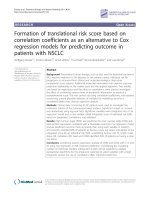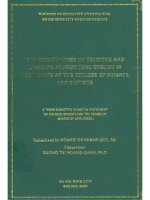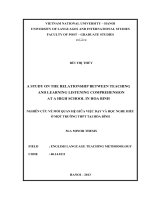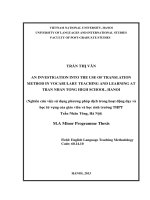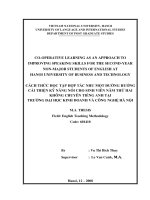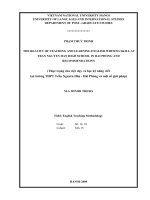Examining the plausibility of extensive reading as an approach to language teaching and learning the case in a high school
Bạn đang xem bản rút gọn của tài liệu. Xem và tải ngay bản đầy đủ của tài liệu tại đây (3.79 MB, 14 trang )
Examining the plausibility of
extensive reading as an approach to
language teaching and learning: The
case in a high school
There being much to be discussed over the most effective ways to actually
teach reading as a skill, the writer has chosen to present a case for the
natural incorporation of Extensive Reading into the teaching and
learning of English at her work place- a high school for the gifted in
Vinh Phuc. This is go ing to be her initial attempt at enhancing the
students’ language learning experience and creating more motivation -be
it intrinsic or extrinsic- for them to work on improving their reading
skills in particular and their knowledge of the target language and
culture in general.
8/10/2014
Contents
Part 1: Introduction .................................................................................................................................. 2
1.
Reasons for choosing the study .................................................................................................. 2
2.
Aims and significance of the study ............................................................................................. 2
3.
Subjects of the study ................................................................................................................... 3
4.
Limits of the study........................................................................................................................ 3
5. Methodology............................................................................................................................................................3
6.
Research time............................................................................................................................... 3
Part 2. The Study ...................................................................................................................................... 4
1. Extensive reading: A definition ....................................................................................................... 4
2. The benefits of extensive reading ................................................................................................... 4
3. Principles of an extensive reading programme ............................................................................. 6
4. A model of an extensive reading club in Vinh Phuc senior secondary school for the gifted ...... 7
REFERENCES ................................................................................................................................................ 12
1
Part1:Introduction
1. Reasons for choosing the study
Various attempts at different levels have been made to improve the quality of
teaching and learning English at school. In fact, theMinistry ofEducation and
Traininghasrecentlysuggestedthatbytheyear2020,atleasthalfoftheyoung
should beabletouseEnglish fluently,and thisisa goalfor teachersofEnglish
andeducationauthoritiestoworktowards.Themainchallengeslay,however,in
thelackofhumanresourcestocaterforsuchneedandthelackofmotivationto
learnEnglishfromthestudents.
Inaworkshopin2011,thewriterwasexposedtoExtensiveReading,an“aidto
languagelearning”whichhasbeenreportedtoworkinmanyanAsiancountries.
Bydoingagreatamountofreadingunderthelanguageteacher’sinstructionand
facilitation, students are claimed to make steady progress in all language
components and languageskills. It is thereforebelieved thatextensivereading
can be the key to language improvement which may be appropriate in our
educational setting, since it provides an alternative to the more common
teacher-centred mode in Vietnam and can hence deal with the two
aforementioned issues effectively. Implementing a programme of extensive
reading in a particular school, however, needs elaborate preponderance. This
studyisthereforetoserveasatheoreticalbasisfortheofficialformationofan
extensive reading club within a senior secondary school for the gifted in Vinh
Phuc.
2. Aims and significance of the study
The study aims to provide a conceptual overview of Extensive Reading and
examine therelevance of thisapproach in a special senior secondaryschoolin
Yenbai. This review and examination may subsequently encourage similar
schools in the area to consider including extensive reading into their
teaching/learning, either as part of a required curriculum or as an extracurricularprogramme.
2
3. Subjects of the study
This being a theoretical review, the primary subject of the study is the vast
amount of literature on extensive reading. Besides, there are 20 students
participating in the informal discussions on their study needs and study
preferences.
4. Limits of the study
Should there be sufficient resources for an actual pilot implementation of the
programmetosupportthereview,thisstudycouldbeconsiderablyimproved.
5. Methodology
The study involves reviewing and summarising the literature on extensive
reading.This is followedbyobservationofandinformal conversationswith 20
studentsinanadvancedEnglishclassintheschool.
6. Research time
September2014–February2015
3
Part2.TheStudy
1. Extensive reading: A definition
Extensive reading is understood as anapproach to language learning/teaching
which is “generally associated with reading large amounts with the aim of
getting an overall understanding of the material. Readers are more concerned
withthemeaningofthetextthanthemeaningofindividualwordsorsentences.”
(Day&Bramford,2002).
2. The benefits of extensive reading
Bell (1998) summarised a number of advantages of extensive reading, from positive
psychological aspectsto real languageenhancement, ofwhich themostimportantare
listedbelow:
a. The provision of authentic, 'comprehensible input'
It has always been proposed that that extensive reading will lead to language
acquisition,providedthatcertainpreconditionsaremet,includingadequateexposure
tothelanguage,interestingmaterial,andalearner-friendlyenvironment.
b. The enhancement of learners' general language competence
Extensive reading increases the opportunity for the learner-reader to practise his
automaticityofwordrecognitionanddecodingthesymbolsontheprintedpage(often
called bottom-up processing). In a study on an extensive reading project with school
children by Elley & Manghubai (1983), significant post treatment gains in word
recognitionandreadingcomprehensionwasreportedtobegainedafterthefirstyear,
andwidergainsinoralandwrittenskillsaftertwoyears.
c. The increase of the students' exposure to the language
It is a fact that the quality of exposure to language that learners receive is of great
importance to their ability to acquire knowledge, whether in terms of grammar or
lexico, from the input. Elley’s (1991:404) research subjects in an extensive reading
programmeshowedrapidgrowthinlanguagedevelopmentcomparedwithlearnersin
regular language programs. He claimed to have seen a "spread ofeffect from reading
competencetootherlanguageskills-writing,speakingandcontroloversyntax,"
4
d. Increased knowledge of vocabulary
It is suggested that only a small percentage of vocabulary learning is due to direct
vocabularyinstruction,theremainderisacquisitionofwordsfromreading.Traditional
approachestotheteachingofvocabulary,inwhichthenumberofnewwordstaughtin
each class was carefully controlled (words often being presented in related sets), is
therefore not sufficient in promoting vocabulary growth. Exposing leaners to reading
textcanfillinthegap.
e. Improvement in writing
With such regular peruse of “comprehensible input”, there have been reported
significantimprovementsinsubjects'writtenwork.Extensivereadingisaccordinglyan
effectivemeansoffosteringimprovementsinstudentswriting.
f. Increased motivation for learners to read
AsBell(1998)putit“readingmaterialselectedforextensivereadingprogramsshould
address students' needs, tastes and interests, so as to energize and motivate them to
readthebooks”.Withsomeneedanalysisinadvance,theorganiser/teachercaneasily
identify the appropriate genre(s) for their students to read, for exampleby means of
informal discussion or the delivery of a need analysis questionnaire. In many cases,
familiarmaterialandpopulartitlesreflectingthelocalculture,or,paradoxically,stories
of faraway land and strangecustoms and practices could be the mostpopular among
schoolchildrenandeventeenagers.
g. The consolidation of previously learned language
The authentic, or near-authentic choice of books to read also mean that by reading
studentscanexperiencewhatistermedthe“recycling”oflanguage.Thisisbyitselfa
form of reinforcement which helps to ensure that new input is “retained and made
availableforspokenandwrittenproduction”(Bell,1998).
h. The building up of confidence with extended texts
It is the case that all classroom reading work in our course books are traditionally
focused on the exploitation of shorts texts. Gradually the average student could be
accustomed to reading those “simple-looking” texts that he/she would back up when
askedtoreadlonger,morecomplexonesforacademicpurposes.Extensivereadingcan
5
thereforeprovidea“fun”, stress-freeapproachto the acclimatisationof studentswith
theselongertexts.
3. Principles of an extensive reading programme
Drawingontheirexperiencewithdifferentextensivereadingprogrammes,researchers
(Day,2002;Bramford,1998;Maley,2008)haveproposedanumberofcriteriaonwhich
todevelopastandardprogrammewhichcouldbeusefulforfuturereference.Someof
themostwidelyknownandwellsupportedonesareasfollows:
a. Maximize Learner Involvement
This is meant to reduce the feeling of obligation which may impede students’
automaticity both during the whole programme and during their individual act of
reading. Particularly, students should be encouraged discuss with the teacher to
identify their own interest in reading, for instance, whether it is books about the
environment/space or fiction books. For students in Nguyen Tat Thanh senior
secondary school for the gifted, this involvement is highly desirable. From a
psychological point of view, most of the students here, being teenagers, have very
strongface-savingneedsandtheteacher’sfailuretogivethemasenseof“ownership”
oftheirreadingprojectmaycausefeelingsofcompulsionandlaterdissatisfaction.
b. Provide a wide range of texts
It is strongly believed that some variety in terms of genre and length of texts can
minimizethestudent’schanceoffeelingbored.Forthesuccessofanylengthyproject,
there should be abundant reading materials available in a range of genre and length.
The teacher should note, however, that whatever type of material, the language
presentedmustbewithinthelanguagecompetenceofthereader-student.
c. Avoid the Use of Tests
Astestinginourcontextisoftenassociatedwithrotelearning,memorizationandlack
offreedom,extensivereadingdoneathomeorduringanagreedperiodoftimeassigned
shouldbetotallydetachedfromtesting.
6
d. Discourage the Over-Use of Dictionaries
Dictionary use may harm the flow of the reader if she/he concentrates too much on
lookingupthemeaningofeverysinglenewword.Pickard(1996:155)commentsthat,
fortheextensivereader-learner"Useofthedictionarywassparing,withthemainfocus
onmeaning".Similarly,Day(2002)suggestsnodictionaryuseduringreadingasmost
ofthechosenmaterialshouldbe“comprehensibleinput”
e. The teacher’s role
Thereisashiftinthe roles thatthe teacherplays inanextensivereading programme
with those she/he does in a normal classroom setting. He/she no longer directs the
students’ learning. Rather, she/he facilitates it. Besides, Bramford (1998) points out
thatinordertoadministertheresourcesefficiently,andtotracestudents'developing
readinghabitsandinterests,effectivemonitoringfromtheteacherisfundamental.
f. Maintain the Entertainment.
This is in fact the key to any extensive reading programme. Only when students are
delightedwithwhattheyaredoingcantheycontinuewiththeirwork.Oncethefunis
kept, automaticity and self-adjustment along the way can be more feasible.
Entertainmentcanbeachievedbydifferentwaysyetthevastamountofresponsibility
is on the teacher as a facilitator. Her/his creativity, suitable follow-up activities, good
managementskillsmayhelp.
4. A model of an extensive reading club in Vinh Phuc senior secondary school for
the gifted
Theaboveanalysisoftheliteratureonextensivereadinghasmadeacaseforan
extensivereadingclubtobesetupinthenextschoolyear.Belowisastep-by-step
proposalforsuchaproject.
a. Membership intake
It is suggested that membership should be open to everyone, but should
primarilytargetatEnglish-majored10graderswhomayhavemoremotivation
to persevere with the project. My observation and informal conversation with
students fromdifferentgrades hasconfirmedme thatfor11or 12 graders the
amountoftimerequiredbytheprojectmaybeasourceofpressureforthemas
7
theyareapproachingmultipleexams(theuniversityentranceexam,theregional
and national academic competitions). In addition, those English majored 10
graders,beingfreshfromjuniorsecondaryschool,maywishtobecomepartofa
society sharing common interest and doing something special. In other words,
they can be more readily involved and easily motivated. For this new reading
club,thenumberofmembershouldnotexceed15.Thislimitationisjustifiedby
thefactthatthesmallerthegroup,theeasieritisfortheinexperiencedteacher
tomonitorandfacilitate.
b. Raising fund
Fortheprojecttowork,theteacherhastomakesurethatthe“comprehensible
input” students get exposed to is abundant and validated. This means at least
200booksneedpurchasingfromreliablepublishers.Thefinanceforthebuying
andlocatingofthosebooksmaycomefromdifferentsources,namely:
PTA: A sensitive issue, yet, most feasible in our school context where
many parents can be willing to support such a programme, especially those
whosechildrenaremembersoftheclub.
ERF:Theextensivereadingfoundationalsoofferssomefinancialsupport
to certain reading programme. A proposal on the programme, including the
detailedbudgetshouldbesubmittedtothegrantcommitteeforconsideration.
c. Need and Competence analysis
Aninformalmeetingamongthemembersandteachercouldeasilyhelpidentifythe
kinds of books to be purchased. There is a wide range of choice covering almost
everygenre,frompoemstoadaptednovelstosuitthelearner-reader’sneeds.
However, the members’ competence has to be examined carefully by means of
testing their speed of reading comprehension. With students being at around the
samegrade,itissupposedthatthelevelsoftheircompetencearemoreorlessthe
same.Again,automaticityshouldbeencouraged.Inotherwords,studentsaregiven
freedom to decide for themselves which level of difficulty is the most suitable for
him. The analysis has implications for the purchase of materials. All extensive
readingmaterialsaregraded according totheir levelsof difficulty(seethesample
8
attached on page 14). If, for instance, the students are comfortable with reading a
textatlevel4,thenshe/heshouldbuyonlythosefromlevel4andup.
Priortothediscussionandcompetenceanalysis,theteachershouldprepareaform
tonotedownallthoseneeds(seebelow)
Name
Genre 1
Genre 2
Level
d. Purchasing/ Accumulating material
BooksforextensivereadingcanbepurchasedfrommajorbookshopsinHanoiand
Hochiminhcities.Furthermore,avarietyoftextsandaudiospecificallydesignedfor
the purposecanbedownloaded online for free. Please find attached on page 14 a
sampleprovided.
e. Other arrangements: time, location, regulations
Theseshouldbetalkedthroughandagreeduponamongthememberswiththe
teacher playing the role of a key member willing to offer help and a more
“global”vision.
f. Extensive reading: 1st cycle
Theclubwilllastforallthethreeyearsofthestudent’sseniorsecondaryschool.
Aftereachyear,reflectionisnecessaryandmorebookscanbeboughttokeepup
with the improvement in the students’ language competence. During the time,
thefollowingshouldbenoted.
9
Monitoring from the teacher
The previously mentioned no-test rule does not mean that follow-up
activitiesareexcludedfromtheproject.Onthecontrary,theyarecrucial
intheteacher’sefforttomonitorthestudents’performanceandprogress.
BelowaresomehighlyrecommendedactivitiesbyBramford(1998)and
Day(2002)
The Reader Interview
Regular conferencing between teacher and student on what they have
readandontheiropiniononthebook.
Read Aloud to the Class/ Use of audio books
Theteachermayneedtoreadsomefavouriteextractsoutloudtotheclass
andthensharehis/herthinkingontheparts.Thisactprovidesamodelof
how to correctly pronounce a word and how to read with emotion.
Students then can follow. In cases when the teacher is not comfortable
withreadingoutloud,theuseofanaudiobookmayhelp.
Student Presentations
Short presentations on books mean more opportunities to practise
speaking skills in a highly authentic context. IN similar projects, it has
beenobservedthatmostof thebookchoicesmadeby students resulted
from recommendations made by friends, not by the teacher. Given the
rightpreparation,encouragement,senseofownershipandbelonging,an
extensive reading program will achieve a direction and momentum
governed by the learners themselves; a large step in the promotion of
studentindependenceandautonomy.
Follow-up written reports/ blurbs/ reviews
Contestscanbeorganisedinwhichstudentschooseontheirowntowrite
areportonabooktheyhavereadoranalternativeblurbtotheoneused
bythepublisher.
10
Part3.Conclusion
The study seeks to provide some insights into extensive reading, focussing on
highlighting thebenefit andrelevanceof extensivereadingin oureducationalsetting.
Fromthisaplanhasbeensuggestedforthenextacademicyear.
Due to the limited experience in this field from the writer, and the time-restricted
reviewoftheliterature,problemsandoversightsareunavoidable.Ithereforewouldbe
grateful to any comments and criticism from the readers for the betterment of this
study.
11
REFERENCES
Bell,T,(1998)ExtensiveReading:Why?andHow?TheIESLJournal,12(4)
Day,Richard,R.(2002)‘TopTenPrinciplesforteachingextensivereading.’Readingin
aForeignLanguage.14(2)
Day,Richard,RandBamford,Julian.(1998)ExtensiveReadingintheSecondLanguage
Classroom.Cambridge:CambridgeUniversityPress.
Elley,W.B.,&Manghubai,F.(1983).'Theeffectofreadingonsecondlanguagelearning.'
ReadingResearchQuarterly,19/1,(pp53-67).
Maley,Alan(2008)‘ExtensiveReading:MaidinWaiting’inB.Tomlinson(ed)English
LanguageLearningMaterials:acriticalreview.London/NewYork:Continuumpp133156
12
Appendix1:Sampleofareadingtext.
Genre:Literature.Grade5
The Devoted Widow
Awidowweepingonherhusband'sgravewasapproachedbyanEngagingGentleman
who,inarespectfulmanner,assuredherthathehadlongentertainedforherthemost
tenderfeelings.
"Wretch!" cried the Widow. "Leave me this instant! Is this a time to talk to me of
love?"
"Iassureyou,madam,thatIhadnotintendedtodisclosemyaffection,"theEngaging
Gentleman humbly explained, "but the power of your beauty has overcome my
discretion."
"YoushouldseemewhenIhavenotbeencrying,"saidtheWidow.
(AmbroseBierce)
13



